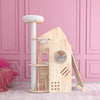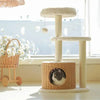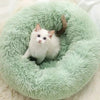- Attention-seeking behavior
- The quest for attention
- The fear of missing out
- Separation anxiety
- Territorial instincts
- The need for stimulation
- Temperature sensitivity
- Natural curiosity
- Hunting instincts
- Learned behavior
- Conclusion
Attention-seeking behavior
Cats, these adorable balls of fur, are known for their independence and sometimes capricious behavior. One of these mysterious behaviors is their aversion to closed doors. Have you ever wondered why your cat seems so determined to enter a closed room? You are not alone. This article reveals the possible reasons for this feline obsession and offers solutions to deal with it.
The quest for attention
Our feline friends are masters at capturing our attention. They may feel frustrated when they can't access a space where they know you are. They may express this frustration by meowing or scratching at the door. It is crucial to establish clear boundaries with your cat to avoid this type of behavior.
The fear of missing out
Like their human counterparts, cats can also experience FOMO , the fear of missing out. If your cat is used to having access to a certain room or space, he may feel anxious or frustrated when he can't access it. To avoid this, it is recommended to leave doors partially open or use pet gates .

Separation anxiety
Cats may experience a form of separation anxiety , especially if they are used to being constantly surrounded by their owner or animal friends. They may feel lonely and anxious when left alone in a room. It is therefore essential to create a safe and comfortable space for your cat when you are away.
Territorial instincts
Cats have a natural territorial instinct . They may feel threatened or uncomfortable when they lose access to a room or area they consider their territory. It is therefore important to provide them with specific spaces that they can consider as their own territory.
The need for stimulation
Cats are intelligent beings who need mental stimulation to stay healthy and happy. When they are locked in a room or closet without toys or stimulation, they may become bored or agitated. It is therefore essential to provide your cat with plenty of options for play and exploration .

Temperature sensitivity
Cats are also sensitive to temperature variations . Being locked in a room without ventilation or temperature control can be uncomfortable for them. Make sure the space is at a comfortable temperature for your cat, using fans or air conditioning in summer, and heaters or heated beds in winter.
Natural curiosity
Cats are naturally curious and love to explore new spaces and objects. A closed door can pique their curiosity and make them even more determined to find out what's behind it. To solve this problem, give your cat plenty of opportunities to explore and discover new things.
Hunting instincts
As natural hunters , cats love to roam freely and explore new areas. Being locked in a room or closet can trigger their hunting instincts and make them more determined to escape. It is therefore essential to provide your cat with plenty of opportunities to play and explore .
Learned behavior
Finally, it's possible that your cat's aversion to closed doors is simply a learned behavior . If you have always let your cat into a room or area, he may have become accustomed to it. It is therefore important to establish clear boundaries with your cat and provide appropriate training and direction .

Conclusion
Cats are fascinating and complex animals with unique personalities and behaviors. By providing mental stimulation , access to necessary resources , and gradual desensitization , you can help your cat feel more comfortable and reduce anxiety. If you are patient and empathetic, you can strengthen your bond with your feline companion and create a more peaceful environment in your home.


































